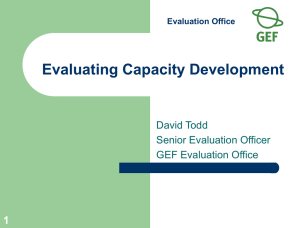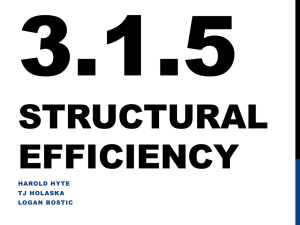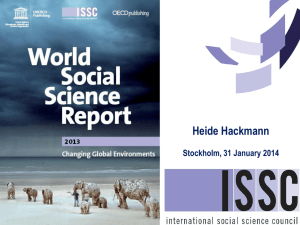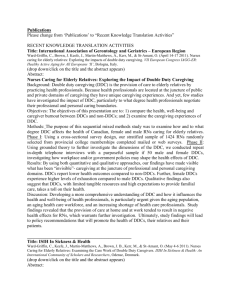Output 3
advertisement
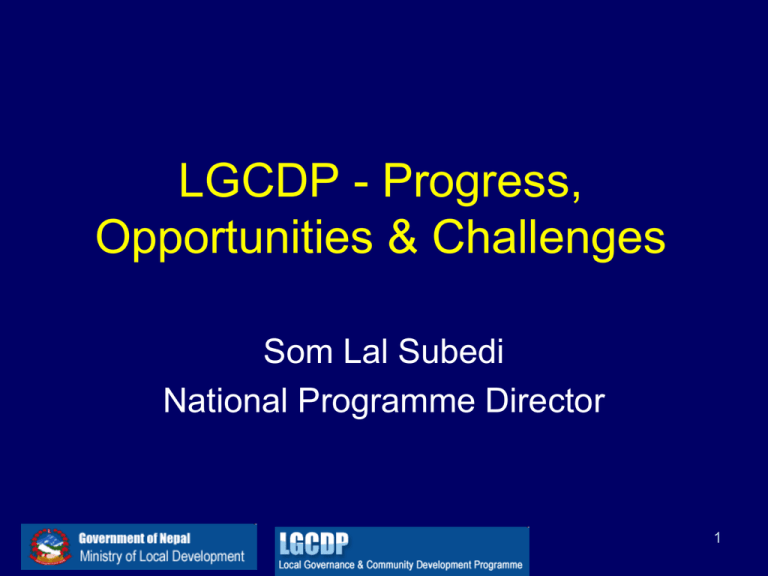
LGCDP - Progress, Opportunities & Challenges Som Lal Subedi National Programme Director 1 Why LGCDP • Poverty reduction through improved services • Strengthening both supply & demand sides of local governance • Aid effectiveness & harmonization through Decentralization & SWAp • Structural reform in grant system • Capacity building 2 Underlying Principles of LGCDP • Social inclusion & gender equity • Downward accountability • Performance & equity-based funding • Rights-based community-led development • Balancing the demand & supply sides of development • Harmonized & process driven approach (aligned with Paris Declaration) 3 Major Instruments of LGCDP • • • • • • • MCPM Information, education & communication Social mobilization LGAF Capacity grants & capacity development Topping up grants Blending government & TA inputs 4 Programme Opportunities • National coverage of 75 DDCs, 58 Municipalities & 3915 VDCs • Serving all people in all corners but targeted at those most in need • Working with all spheres of governance public sector, private sector & civil society • Supported by a unified approach from government & DPs 5 Achievements Output One - Communities & Community Organisations Participate in the LG Process • Social Mobilization guidelines approved • District Social Mobilization Committee formed in 8 Districts • SM monitoring underway 6 7 Achievements - Output 2 Increased capacity of citizens, communities & marginalised groups to assert their rights & hold LBs accountable • IEC guidelines developed & approved • LGAF NC formed & active – Civil Society Representatives selected • DAG training guidelines approved - Rs 1 lakh grant provided to all 75 DDCs • CD of district Dalit & Janjati coordination committee guidelines approved - Rs 1 lakh grant provided to all 75 DDCs 8 Achievements - Output 3 LBs gain access to greater fiscal resources in equitable & appropriate ways • Topping-up grant – guidelines for DDC, VDC & Municipality approved – Around Rs 2.5 billion provided to 67 DDCs, 56 Municipalities & 2,749 VDCs • All 58 Municipalities assessed for MCPMs • Overview of finance system - MCPMs, block grant guidelines, allocation completed • QA manual for MCPM prepared & piloted in 5 DDCs & 4 Municipalities. 9 Achievements - Output 4 Appropriate CD services passed at all levels of LG service delivery • Capacity Development manuals for all LBs designed & approved • CD plan preparation service providers in all DDCs & Municipalities selected • CD grant provided to all DDCs & Municipalities • Over 3,000 LB staff, service providers & politicians oriented on LGCDP; CD plan; social mobilization; GESI; MCPM; environmental & social safeguards & M&E 10 Achievements - Output 5 LBs’ service delivery mechanisms & processes fine-tuned • Sector conditional grant manual developed & approved • Grant provided to 5 DDCs to implement sector conditional grant system • EoIs for 28 activities assessed & RfPs for 9 issued • SWAp background prepared 11 Achievements - Output 6 Decentralisation policy enables more effective, transparent & accountable LBs • Operation manual on implementation of social & environment safeguard measures approved • Environment focal desk established in 75 DDCs & grants provided • Guide for Environment Management Plan for infrastructure projects prepared • DIMC meeting organized 12 Achievements - Output 7 Enhanced capacity of national government & institutions to support LBs • • MLD’s CD action plan developed & approved MLD’s HR section upgraded with IT support • MLD’s GESI section established • • • Exposure visits for MLD & LBFC staff Baseline survey of 60 districts completed Workshop on future structure & role of LBs in federal structure organized for legislature Policy paper on LBs’ role in federal system prepared • 13 Achievements - Output 8 Programme implementation support • PCU fully operational • 11 National specialists appointed • Cluster Units established in 5 regions & 5 Cluster Coordinators recruited • District Facilitators recruited in 61 DDCs • NDVS selected (100 volunteers) • LGCDP Operations’ Manual drafted 14 Achievements - Institutional mechanisms • Oversight Arrangements operational – NAC, NACSC, JFA, UNJPSC meetings held • Coordination arrangements operational – Thematic Groups functioning – Procurement evaluation teams established – Periodic review workshops underway • QAM & Annual Technical Review underway • Workplans & budgets prepared & updated 15 LGCDP Continues to Expand • JFA has two more signatories & preparation for 2 more completed • UNIFEM is a new partner • UNDP’s Poverty & Environment Initiative linked into LGCDP • PASRA to be aligned with Social Mobilization • Innovative Social Protection programme about to commence 16 To Summarise • LGCDP’s structure all in place • Systems developed – management, funds’ flow, reporting, coordination • Orientation well underway • Guidelines developed, approved & disseminated • Enabling environment created thus LGCDP now poised to start achieving its intended results 17 Planned Achievements by end FY 09/10 Output 1: • Capacity building of around 400 local service providers & DDC staff on social mobilization underway • Social mobilization implementation in 1,600 VDCs • 300 district Social mobilization committee members orientated • Operation manual for GESI mainstreaming Output 2: • IEC core message planned • Operationalize LGAF 18 Planned Achievements by end FY 09/10 Output 3: • Blended block grant guidelines drafted • MCPM assessments of DDCs completed • MC assessments of VDCs underway • Quality assurance assessment of MCPM • Orientation on MCPMs well underway • Revenue mobilization training for LBs staff 19 Planned Achievements by end FY 09/10 Output 4: • CD plan for 75 DDCs & 58 Municipalities being developed • Continuation of core & standard training to LB staff, political party, civil society, & user’s group – estimated 3,000 recipients Output 5: • LBs’ audit guidelines drafted • Update & refine M&E indicators 20 Planned Achievements by end FY 09/10 Output 6: • LBs’ staffing policy review underway • Local environment policy proposals underway • Local environment policy guidelines • Train environment officers of LBs Output 7 • Existing LB M&E system reviewed • Baseline survey of local bodies • Operational manual of GESI strategy drafted • Capacity development plan of MLD drafted 21 Activities deferred to next FY Output 3 • Preparation of LBs revenue operation manual • Introduce land tax in municipalities • Design revenue / expenditure computer software package Output 4 • Develop international standard PFM system and training package Output 5 • Pilot safety net & social assistance program 22 Activities deferred to next FY Output 6 • Review decentralization & sector devolution policy • Formulate investment plan for grant expenses in the devolved sector • Preparation of action plan on sector devolution implementation Output 7 • Defining the role & functions of Fiscal Commission in the context of federalism 23 Financial status JFA • Total budget of LGCDP for the FY 2009/10 – US$ 43.70 million • Total budget delivered as of 15 Nov 2009 – US$ 38.89 million UNDP • US$ 255,000 budget - US$ 210,000 expenditure UNCDF • US$ 292,000 budget - US$ 115,000 expenditure 24 Challenges • • • • Monitoring & Evaluation of all VDCs Transforming LGCDP into SWAp Continuation & sustaining SM Empowering the local political mechanism • Working with two fiscal year planning • LB staff resources & time to absorb LGCDP • Generalization vs LGCDP & LBs’ limitations • Mobilizing the LGCDP for LB restructuring 25 LGCDP’s Expectations • Creating more conducive & supportive environment by all stakeholders • Support & suggestions / feedback 26

